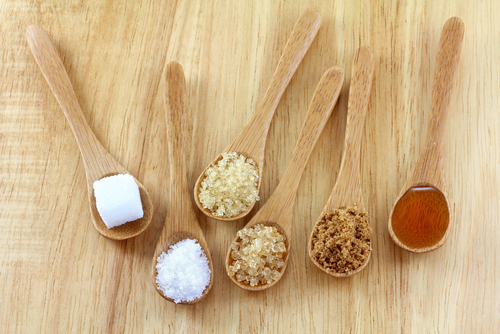Sugar has been part of our diet for decades and the amount of sugar that we consume is constantly increasing. In 1900, we used to eat 4 pounds of sugar per year. Today, we’re approximately consuming around 130 pounds annually. There is sugar in almost every processed food, so in about 80% of the food that we find at the grocery store.
We love sugar mostly because it gives us a feeling of pleasure. Sweet taste stimulates the brain and the production of neurotransmitters such as endorphin and dopamine. That’s why it is so hard to cut it off from our everyday life.
Sugar is sweet, but the impact of consuming it is not so sweet. Sugar has no good nutrients and excessive use can lead to unwanted side effects like mental fogginess, diabetes, lower immune system, emotional stress, ADHD, depression, anxiety, heart disease, adrenal exhaustion, cravings, general weakness and even cancer.
You must try to avoid refined sugar as much as you can. It is a silent poison and you can just feel better not using it.
Here are some neat tricks to help you change your habits
Eat protein: Eat them at your first meal, it’s a good start to help stabilize your blood sugar throughout the day. You should make sure to get enough protein all day long. Protein must make up around 25%-30% of your total calorie intake. Here are some good sources of protein: spirulina, tempeh, tuna, chicken, lentils, Greek yogurt, peanut butter, eggs and many more.
Exercise: Exercise is a good way to use the sugar available in your bloodstream. While moving, your muscles will use it so go for a brisk walk or find something else that you like to do and be consistent with it. Thirty minutes of medium intensity exercise every day is your prescription.
Add fibre to your diet: Fibre lowers the speed of sugar absorption. Add fibre to your meals and snacks to get the optimal intake that should be around 30 grams per day.
- Chia seeds
- Flax seeds
- Hemp seeds
- Oatmeal
- Legumes
- Leafy greens
- Fruits and vegetables
Breathe: Stress increases the production of cortisol and epinephrine. These hormones act to increase blood sugar to help you fight or flight. Relaxation such as abdominal respiration is a good way to stay calm and in balance.
Sleep: A lack of sleep (six hours or less) on a regular basis boosts your blood sugar level. It also decreases the production of leptin (satiety signal) and raises the production of ghrelin (hunger signal). So go to bed at almost the same time each night. Go easy on stimulants like coffee, chocolate, tea and sugar.
There are also many nutrients that can help you reduce sugar cravings and keep your blood sugar in good balance. You can try vitamins B and C, zinc, chromium and L-Glutamine, an amino acid. Talk to your health coach to see what the best strategy is for you.
Melanie Blanchard, Bachelor of Physical Education and Health coach.


